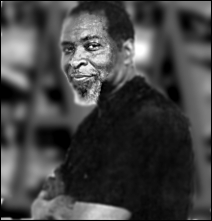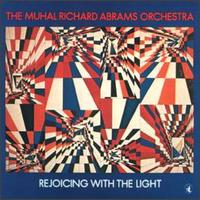


A FIRESIDE
CHAT WITH MUHAL RICHARD ABRAMS
Muhal Richard
Abrams' piano hand is strong. What amazes me is that his composing hand
is stronger. A man of few words, I will exit the stage and leave you in
Abrams' good hands, as always, unedited and in his own words.
FRED JUNG: Let's start from the beginning.
MUHAL RICHARD ABRAMS: I chose music. Music is the path period. I just
chose to deal with music. I'm doing what I was supposed to do. When the
time came for me to deal with music, I got that feeling and I started
to deal with music. That was that.
FJ: Did you take formal lessons?
MUHAL RICHARD ABRAMS: No.
FJ: So you are pretty much a self-taught musician?
MUHAL RICHARD ABRAMS: Yeah, but I've done in depth studies of my own through
having the ability to analyze and study things, so I always taught myself.
I encountered some formal training in later years, but only minimal. I
am predominantly self-taught.
FJ: But you spent time at the Chicago Music College.
MUHAL RICHARD ABRAMS: Yeah, but that was just a short period. I was there
to study some basic things, but that was very minimal. That had no affect
on me, none, what so ever. I mean, don't misunderstand me now, of course,
I learned things there, but they were like basic things. Of course, those
things are part of my learning too. I'm not discarding that, but most
of my music development and learning comes from a self-taught basis. Chicago
Music College, that was like, that had to be 1946 or '47 and so it has
been a lot of years since then. I'm an academic musician now, but that
is because I am taught. I taught myself, but I am not academic in the
sense of the institution and so I would not use the word academic anyway.
I am self-taught. Let's look at it this way, Fred. When you are in an
institution, what they had was they taught music from a classical music
base, which is theory and stuff like that, which is good. There was music
that they didn't teach there because no one there was experienced in that
kind of music. So one has to teach one's self to practice in association
in that environment. That is what happened with me.
FJ: I am curious as to how you progressed the music initially, was it
through listening to records?
MUHAL RICHARD ABRAMS: Well, of course, I mean, if you are in jazz music,
that was the way you learned jazz music. There was no jazz music in schools.
Jazz music in academics is a more recent development.
FJ: When did you form your Experimental Band?
MUHAL RICHARD ABRAMS: I would say about 1963.
FJ: Why did you decide to form the Experimental Band?
MUHAL RICHARD ABRAMS: To have a platform to express my compositions. To
people that people may recognize that were in the band that went on to
be AACM people were Roscoe Mitchell and Joseph Jarman. But there were
other people that did not proceed on any further than that particular
situation.
FJ: You mentioned Roscoe Mitchell and Joseph Jarman, both of whom helped
you form the AACM.
MUHAL
RICHARD ABRAMS: No.
FJ:
No?
MUHAL
RICHARD ABRAMS: No, I did, yes. The founders of the AACM were Philip Cohran,
Jodie Christian, Steve McCall, and myself.
FJ:
So Roscoe Mitchell was not a founding member of the AACM?
MUHAL
RICHARD ABRAMS: No. Let me say this now, Fred. Let's not make a controversy.
There is no controversy. People who were beginning AACM members consider
themselves as founding members. That is correct, but they weren't the
founders in terms of the idea of the AACM.
FJ:
And what was the idea of the AACM?
MUHAL
RICHARD ABRAMS: The idea of the AACM was to develop a platform where one
could express, compose, and perform original music, original music meaning
music emanating from the members within the organization.
FJ:
Was there no platform for that at the time?
MUHAL
RICHARD ABRAMS: Not from the basis that we perceived it from, no. No.
Not in our area. I know of no other. I think the AACM was the first of
its kind in the world. We were dealing with music. The fact that we were
black was self-evident. We were dealing with music. It served the black
community in the sense that we were black musicians taking care of ourselves
in an artistic manner and so naturally, the community was proud of that,
but we were dealing with music, which encompasses the universe itself.
FJ:
What is the legacy of the AACM?
MUHAL
RICHARD ABRAMS: I think that the AACM expressed and still expresses the
right of the individual to express the individual's unique and personal
approach to the music in this case, which is every person's right, whether
they choose to proceed in that manner or not. Others who have pursued
a similar type of approach as individuals, I think it has significantly
contributed to the scene. I think the example of individualism is at the
height of what has been contributed by the AACM and others, Ornette Coleman,
different people.
FJ:
Do you see that kind of individuals in young musicians today?
MUHAL
RICHARD ABRAMS: Sure, a lot of them. Musicians have individualism. But
what I am talking about is bringing people who bring a complete original
approach to things and shape things a little differently from everyone
else, individuals of that type. We are all individuals and we have unique
approaches, but there are those who design unconventional setups for themselves
and so as a result, they, Cecil Taylor, Ornette, those sorts of people.
I developed my music before I ever heard those people. Of course, I was
greatly encouraged and inspired after hearing them, of course, but was
developing music independent of influences. We developed it as musicians
because we felt we should proceed in that manner. The scene has many people
participating in that kind of activity today, but it comes because of
earlier efforts, the example of earlier efforts. That is what the scene
really is. It is an example of something. It is not how to play something
or lick to play. It is nothing like that. It is an example of examining
and looking at yourself.
FJ:
Was it important for you to study and learn things beyond the scope of
the music itself, such as religion and philosophy?
MUHAL
RICHARD ABRAMS: I think one has to decide those things for one's self,
but I have always found that to be a part of what I do, sure.
FJ: How has
that helped enrich your musical creativity?
MUHAL
RICHARD ABRAMS: Well, we are relating to life. There is no music without
you relating to your life itself. You are relating to your life. Everything
becomes one. You become the way you are. It is not a desire to achieve
some goal in some certain area. It is all interrelated.
FJ:
The crux of your discography is on small indie labels, has no major label
approached you to do a session for them?
MUHAL
RICHARD ABRAMS: Well, labels go after what they feel like they should
record, but being a musician and recording music has nothing to do with
what recording companies think. It has nothing to do with that, you see.
There are a lot of musicians who are not recorded by certain companies.
It is the way the music business is. They choose to record who they want
to record and also, the type of music they want to record. What they do
or what they don't do has nothing to do with me, none what so ever. I
record it and I record it where I am supposed to record it.
FJ:
You seem at peace with that.
MUHAL
RICHARD ABRAMS: Well, why should it affect me? It has nothing to do with
me. Black Saint records are in every store you go in. Black Saint records
have been in the stores right besides the Verve records and the other
records all these years. I can go up to Virgin Records right now and they're
in the bin, sure. But the thing is, Fred, what recording companies do
has nothing to do with me. I concentrate on music. I concentrate on what
I am dealing with in this art.
FJ:
How are developing that art?
MUHAL
RICHARD ABRAMS: By daily applying myself via practice of the art. That
is what you do. I practice like most musicians do. You practice. If you
are a musician, you practice being a musician. That is just it. It is
not a big deal if you are seriously pursuing development of your craft.
There is always something to learn, always something to learn. We all
have something a little different from the other person. So you could
always learn from things that other people do, just like they can learn
from what you do. There is always a lot to learn from older people, from
younger people that are coming along now. There is always something to
learn. Everybody has a particular approach that could reveal facts about
things that otherwise wouldn't come about unless it came from that particular
person.
FJ:
And the future?
MUHAL
RICHARD ABRAMS: I am doing what I do all the time. The choice of recording
companies is not my affair. I am doing what I do all the time. I perform.
In fact, there will be a recording of some of my written works in August.
I have a two piano piece. Two classical pianists will play the piece.
I have a double bass and piano duet piece. Two classical musicians are
going to play that and then I have a piano and violin composition and
then I have a string quartet with voice piece that will be coming out.
These are classical pieces. One the same recording, I will be performing
improvised piano solos and I have an electronic piece that I composed
that will be on the same album. There is a label being developed, but
they are going to be recording. We have already set up a date. We will
record in August. We have four dates in August. I am going to the former
Yugoslavia. We are playing a festival there. Then next month, I will be
going to the North Sea Jazz Festival. I will be bringing a quartet to
both. Right now, in New York, in September, September 16, I will be performing
an AACM concert. I will be performing a solo piano concert in the first
half and in the second half, I am writing an extended piece for a twelve-piece
group.
Fred
Jung is Jazz Weekly's Editor-In-Chief and is still wondering why Muhal
Richard Abrams isn't in the Down Beat Hall of Fame. Comments? Email
Fred.